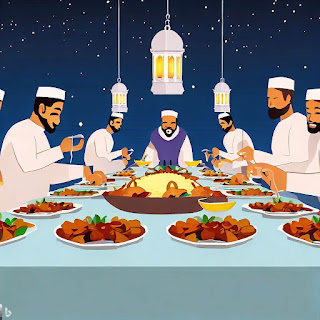Ramadan is a sacred month in the Islamic calendar,
observed by millions of Muslims worldwide. It is a time of deep spiritual
reflection, self-discipline, and fasting from dawn until sunset. In this blog
post, we will delve into the traditions and practices of Ramadan, exploring its
significance and the profound impact it has on Muslims’ lives. From fasting to
prayer, charity, and community, Ramadan encompasses various acts of worship
that aim to enhance one’s spiritual connection with Allah. Join us as we dive
into the beauty and essence of this holy month, understanding its rituals,
traditions, and the transformative power it holds.
1. The Significance of Ramadan:
Ramadan holds immense significance for Muslims, as it
commemorates the revelation of the Quran to the Prophet Muhammad. It is a time
for spiritual renewal, self-reflection, and seeking closeness to Allah. Muslims
view Ramadan as an opportunity to purify their souls, seek forgiveness, and
strengthen their relationship with Allah and fellow believers. Fasting during
Ramadan is considered a form of worship and a demonstration of self-control,
empathy, and solidarity with those less fortunate.
2. Fasting: A Spiritual Journey:
Fasting is the central aspect of Ramadan, where Muslims
abstain from food, drink, and other physical needs from dawn until sunset. It
is a deeply personal and spiritual experience that goes beyond the act of
refraining from food and drink. Fasting teaches discipline, patience, and
gratitude while heightening spiritual awareness. It is a time of
self-reflection, increased devotion, and seeking forgiveness. Fasting also
serves as a reminder of the blessings of sustenance and the importance of
empathy towards the needy.
3. The Night of Power (Laylat al-Qadr):
Laylat al-Qadr, also known as the Night of Power, is
considered the most sacred night during Ramadan. It is believed to be the night
when the first verses of the Quran were revealed to the Prophet Muhammad.
Muslims engage in prayer, recitation of the Quran, and supplication during this
night, seeking blessings and spiritual rewards. The Night of Power holds
immense spiritual significance, and many Muslims spend the last ten nights of
Ramadan in deep worship and reflection, striving to attain the blessings and
forgiveness associated with this special night.
4. Acts of Worship and Charity:
In addition to fasting, Ramadan encourages Muslims to
engage in acts of worship and charitable deeds. Muslims are encouraged to
increase their prayers, recitation of the Quran, and engage in acts of kindness
and charity. Giving back to the community through charitable acts, feeding the
hungry, and providing support to those in need are essential aspects of
Ramadan. This emphasis on charity fosters a sense of empathy, compassion, and
social responsibility among Muslims, strengthening the bonds within the
community.
5. The Joyous Celebration of Eid al-Fitr:
At the end of Ramadan, Muslims celebrate Eid al-Fitr, the
Festival of Breaking the Fast. It is a joyous occasion where Muslims gather for
prayer, share festive meals, exchange gifts, and engage in acts of charity. Eid
al-Fitr marks the culmination of a month-long journey of spiritual reflection,
self-discipline, and devotion. It is a time of gratitude, forgiveness, and
celebration, where families and communities come together to express their joy
and gratitude for the blessings bestowed upon them.
Conclusion:
Ramadan is a sacred and transformative month for Muslims
worldwide. It is a time of intense spiritual reflection, self-discipline, and
devotion. Through fasting, prayer, acts of
worship, and charity, Muslims seek to deepen their
connection with Allah, purify their souls, and strengthen their relationships
within the community. Ramadan serves as a reminder of the importance of
self-discipline, empathy, and gratitude. It offers an opportunity for personal
growth, self-reflection, and increased devotion. As Muslims engage in fasting
and engage in acts of worship during this holy month, they experience a
profound spiritual journey that brings them closer to Allah and enriches their
lives with blessings, peace, and a renewed sense of purpose.


0 Comments